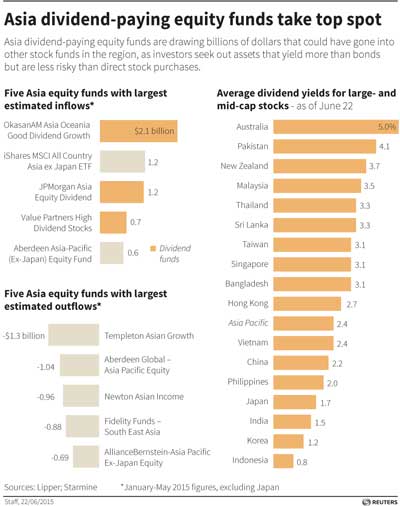Friday Feb 27, 2026
Friday Feb 27, 2026
Monday, 6 July 2015 00:00 - - {{hitsCtrl.values.hits}}


Reuters: Money raised in global equity capital markets rose in the first half of the year to top $ 500 billion, but bankers’ fees fell as secondary share sales supplanted lucrative stock market listings as the dominant deals.
The rise in secondary sales was partly down to private equity funds taking the opportunity to sell down stakes in companies that floated last year, following the expiration of ‘lock-up’ periods when shares cannot be sold, analysts said.
They also said a rise in M&A activity had led to some firms that had planned listings this year instead being bought by other companies.
Initial public offerings (IPOs) had reigned supreme in the first half of last year, but they dropped by 18% to $ 96.8 billion in the same period of 2015, Thomson Reuters data showed last week.
Meanwhile money raised from secondary share sales rose by a fifth in the year to the end of June, hitting a record $ 365.3 billion and accounting for almost three-quarters of all activity.
Goldman Sachs topped the league tables both by fees and volumes, followed by JP Morgan and Morgan Stanley, according to Thomson Reuters data.
Global equity capital market (ECM) activity rose 7% to $ 509.9 billion. But the switch away from IPOs to less well-paid secondary shares sales pushed fees down by 4% to a total $ 12.1 billion.
European stock market flotations in the first half raised a quarter less than a year before.
Nervousness about the Greece crisis had so far had little impact on deals, but following a showdown between the country and its creditors, concerns about a possible default forced two German companies to delay flotations.
Firms that had planned listings this year but were instead bought up by other companies include British holiday firm Center Parcs and German perfume retailer Douglas.
“M&A activity has started to pick up,” said Klaus Hessberger, co-head of EMEA (Europe, Middle East, Africa) ECM at JP Morgan. “In this volatile market, if banks talk to clients about the possibility of M&A as well as an IPO, it’s a stronger pitch which gives companies the flexibility depending on market conditions.”
Mark Hantho, global head of ECM at Deutsche Bank said: “The global IPO market has been relatively subdued compared to an extremely active 2014. One major reason for the reduced activity this year is a lack of supply rather than demand.”
China ‘The main show’
ECM activity in the Asia Pacific region soared in the second quarter, making it the second-busiest quarter on record as a rally in Chinese stocks fuelled demand for shares in both mainland China and Hong Kong.
At $ 16.3 billion, Shanghai topped global exchanges by amount raised, beating New York and London for the first time since 2010.
Proceeds from equity deals in the Asia Pacific region more than doubled from a year earlier to $ 89.3 billion for the quarter. Activity across the first half of the year reached $ 147.1 billion, compared with $ 84.9 billion in the same period in 2014.
Stocks in mainland China, also known as A-shares, have more than doubled in value this year, with the performance of IPOs in particular attracting an army of retail investors.
The country also saw 2015’s largest IPO so far, with brokerage firm Guotai Junan Securities launching its $ 4.8 billion listing on the Shanghai exchange.
Consulting firm EY expects the number of IPOs in mainland China to reach about 400 for 2015, from about 190 in the first half, with funds raised forecast to grow to 250 billion yuan ($ 40 billion) from about 150 billion yuan so far. Large offerings are also expected in Hong Kong in the second half.
But the rally in Shanghai and Shenzhen has raised some concerns that valuations are getting too expensive, with a market plunge in recent sessions underscoring concerns over rising volatility in China.
“Obviously the main show, the only show in Asia this year, has been the A-share market in terms of performance. However, the valuations in some sectors are pretty stretched,” said Jonathan Penkin, co-head of the Financing Group for Goldman Sachs in Asia Pacific, excluding Japan.